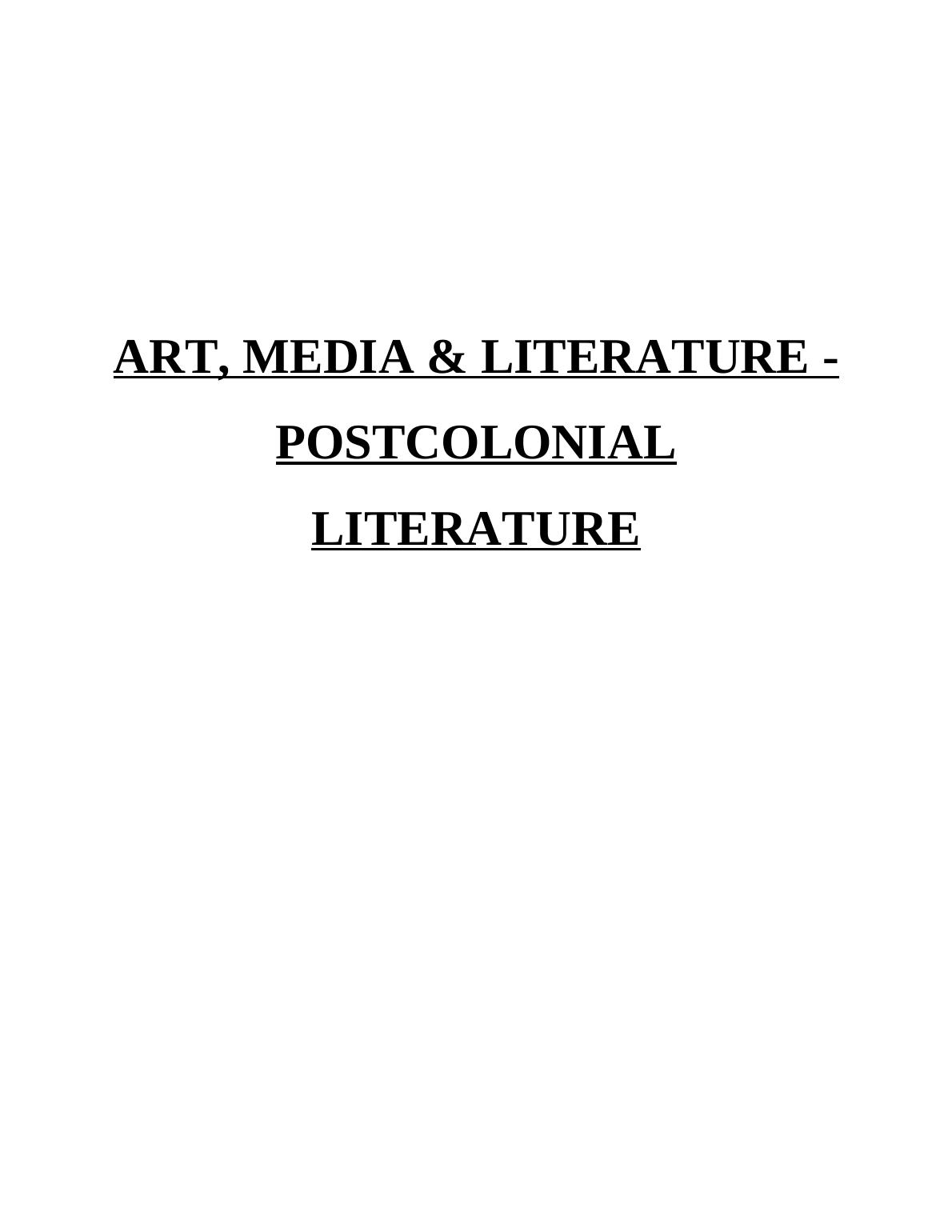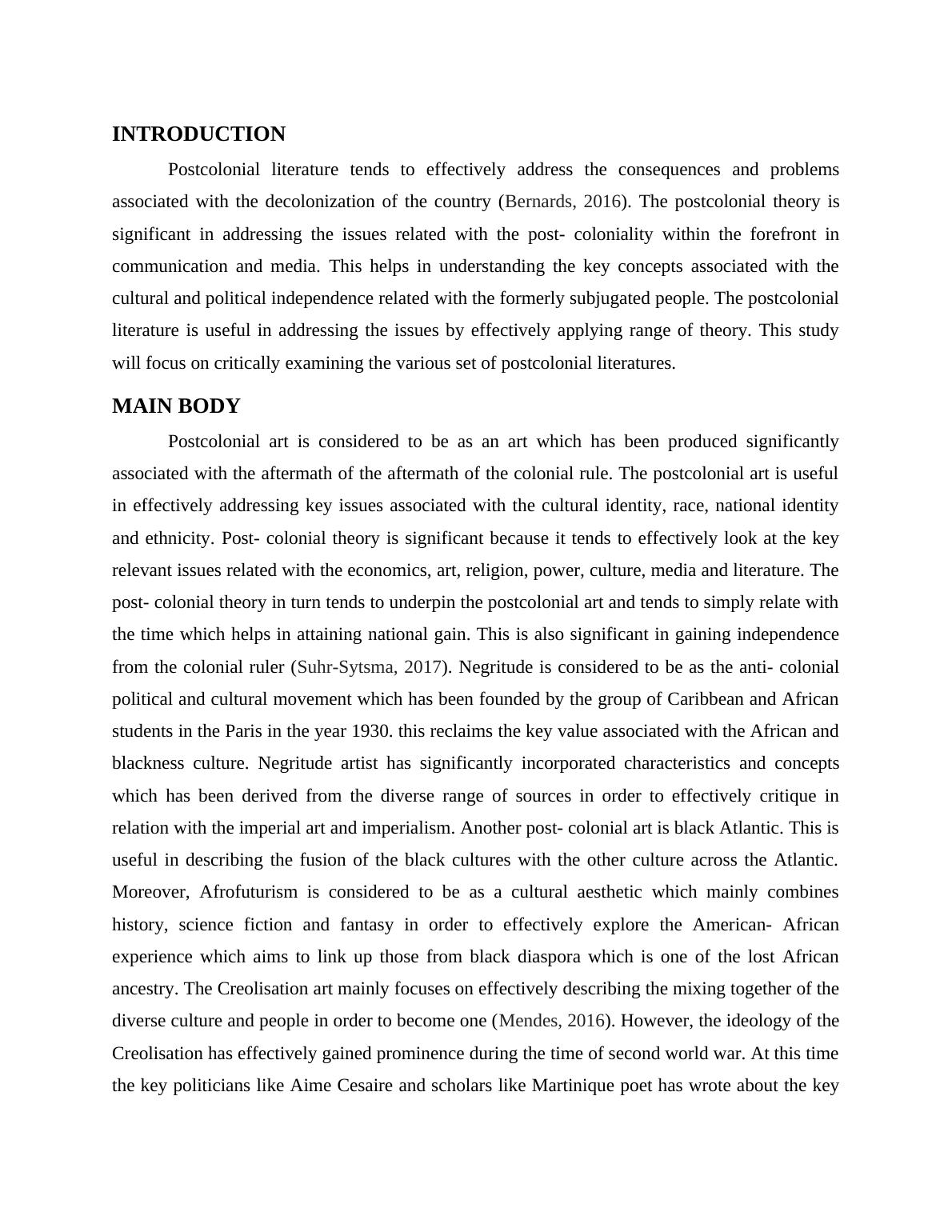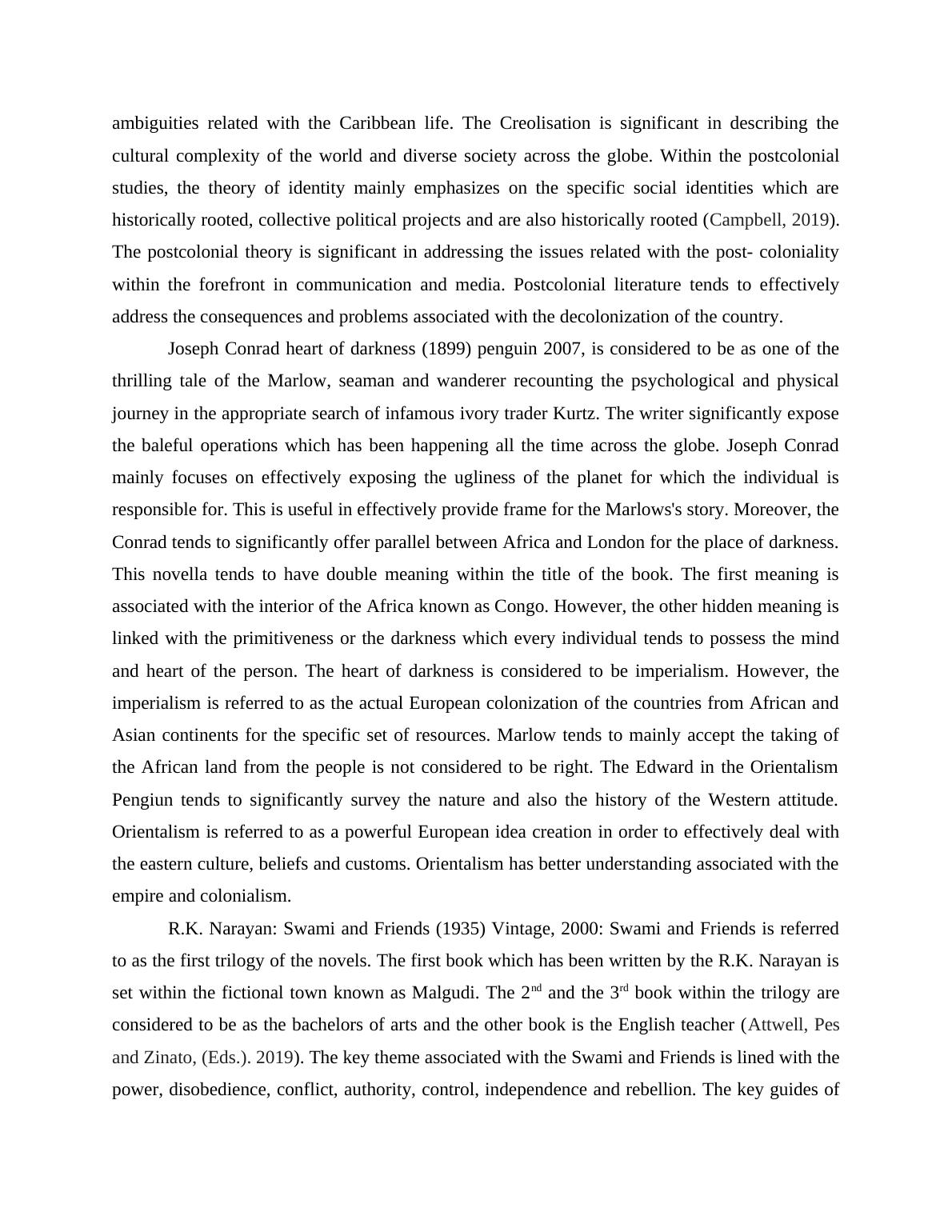Postcolonial Literature: Addressing Consequences and Problems
13 Pages4874 Words37 Views
Added on 2023-01-09
About This Document
This study focuses on critically examining postcolonial literature and its significance in addressing the consequences and problems associated with decolonization. It explores key concepts and theories in the field.
Postcolonial Literature: Addressing Consequences and Problems
Added on 2023-01-09
ShareRelated Documents
ART, MEDIA & LITERATURE -
POSTCOLONIAL
LITERATURE
POSTCOLONIAL
LITERATURE

Table of Contents
INTRODUCTION...........................................................................................................................3
MAIN BODY...................................................................................................................................3
CONCLUSION..............................................................................................................................11
REFERENCES..............................................................................................................................12
INTRODUCTION...........................................................................................................................3
MAIN BODY...................................................................................................................................3
CONCLUSION..............................................................................................................................11
REFERENCES..............................................................................................................................12

INTRODUCTION
Postcolonial literature tends to effectively address the consequences and problems
associated with the decolonization of the country (Bernards, 2016). The postcolonial theory is
significant in addressing the issues related with the post- coloniality within the forefront in
communication and media. This helps in understanding the key concepts associated with the
cultural and political independence related with the formerly subjugated people. The postcolonial
literature is useful in addressing the issues by effectively applying range of theory. This study
will focus on critically examining the various set of postcolonial literatures.
MAIN BODY
Postcolonial art is considered to be as an art which has been produced significantly
associated with the aftermath of the aftermath of the colonial rule. The postcolonial art is useful
in effectively addressing key issues associated with the cultural identity, race, national identity
and ethnicity. Post- colonial theory is significant because it tends to effectively look at the key
relevant issues related with the economics, art, religion, power, culture, media and literature. The
post- colonial theory in turn tends to underpin the postcolonial art and tends to simply relate with
the time which helps in attaining national gain. This is also significant in gaining independence
from the colonial ruler (Suhr-Sytsma, 2017). Negritude is considered to be as the anti- colonial
political and cultural movement which has been founded by the group of Caribbean and African
students in the Paris in the year 1930. this reclaims the key value associated with the African and
blackness culture. Negritude artist has significantly incorporated characteristics and concepts
which has been derived from the diverse range of sources in order to effectively critique in
relation with the imperial art and imperialism. Another post- colonial art is black Atlantic. This is
useful in describing the fusion of the black cultures with the other culture across the Atlantic.
Moreover, Afrofuturism is considered to be as a cultural aesthetic which mainly combines
history, science fiction and fantasy in order to effectively explore the American- African
experience which aims to link up those from black diaspora which is one of the lost African
ancestry. The Creolisation art mainly focuses on effectively describing the mixing together of the
diverse culture and people in order to become one (Mendes, 2016). However, the ideology of the
Creolisation has effectively gained prominence during the time of second world war. At this time
the key politicians like Aime Cesaire and scholars like Martinique poet has wrote about the key
Postcolonial literature tends to effectively address the consequences and problems
associated with the decolonization of the country (Bernards, 2016). The postcolonial theory is
significant in addressing the issues related with the post- coloniality within the forefront in
communication and media. This helps in understanding the key concepts associated with the
cultural and political independence related with the formerly subjugated people. The postcolonial
literature is useful in addressing the issues by effectively applying range of theory. This study
will focus on critically examining the various set of postcolonial literatures.
MAIN BODY
Postcolonial art is considered to be as an art which has been produced significantly
associated with the aftermath of the aftermath of the colonial rule. The postcolonial art is useful
in effectively addressing key issues associated with the cultural identity, race, national identity
and ethnicity. Post- colonial theory is significant because it tends to effectively look at the key
relevant issues related with the economics, art, religion, power, culture, media and literature. The
post- colonial theory in turn tends to underpin the postcolonial art and tends to simply relate with
the time which helps in attaining national gain. This is also significant in gaining independence
from the colonial ruler (Suhr-Sytsma, 2017). Negritude is considered to be as the anti- colonial
political and cultural movement which has been founded by the group of Caribbean and African
students in the Paris in the year 1930. this reclaims the key value associated with the African and
blackness culture. Negritude artist has significantly incorporated characteristics and concepts
which has been derived from the diverse range of sources in order to effectively critique in
relation with the imperial art and imperialism. Another post- colonial art is black Atlantic. This is
useful in describing the fusion of the black cultures with the other culture across the Atlantic.
Moreover, Afrofuturism is considered to be as a cultural aesthetic which mainly combines
history, science fiction and fantasy in order to effectively explore the American- African
experience which aims to link up those from black diaspora which is one of the lost African
ancestry. The Creolisation art mainly focuses on effectively describing the mixing together of the
diverse culture and people in order to become one (Mendes, 2016). However, the ideology of the
Creolisation has effectively gained prominence during the time of second world war. At this time
the key politicians like Aime Cesaire and scholars like Martinique poet has wrote about the key

ambiguities related with the Caribbean life. The Creolisation is significant in describing the
cultural complexity of the world and diverse society across the globe. Within the postcolonial
studies, the theory of identity mainly emphasizes on the specific social identities which are
historically rooted, collective political projects and are also historically rooted (Campbell, 2019).
The postcolonial theory is significant in addressing the issues related with the post- coloniality
within the forefront in communication and media. Postcolonial literature tends to effectively
address the consequences and problems associated with the decolonization of the country.
Joseph Conrad heart of darkness (1899) penguin 2007, is considered to be as one of the
thrilling tale of the Marlow, seaman and wanderer recounting the psychological and physical
journey in the appropriate search of infamous ivory trader Kurtz. The writer significantly expose
the baleful operations which has been happening all the time across the globe. Joseph Conrad
mainly focuses on effectively exposing the ugliness of the planet for which the individual is
responsible for. This is useful in effectively provide frame for the Marlows's story. Moreover, the
Conrad tends to significantly offer parallel between Africa and London for the place of darkness.
This novella tends to have double meaning within the title of the book. The first meaning is
associated with the interior of the Africa known as Congo. However, the other hidden meaning is
linked with the primitiveness or the darkness which every individual tends to possess the mind
and heart of the person. The heart of darkness is considered to be imperialism. However, the
imperialism is referred to as the actual European colonization of the countries from African and
Asian continents for the specific set of resources. Marlow tends to mainly accept the taking of
the African land from the people is not considered to be right. The Edward in the Orientalism
Pengiun tends to significantly survey the nature and also the history of the Western attitude.
Orientalism is referred to as a powerful European idea creation in order to effectively deal with
the eastern culture, beliefs and customs. Orientalism has better understanding associated with the
empire and colonialism.
R.K. Narayan: Swami and Friends (1935) Vintage, 2000: Swami and Friends is referred
to as the first trilogy of the novels. The first book which has been written by the R.K. Narayan is
set within the fictional town known as Malgudi. The 2nd and the 3rd book within the trilogy are
considered to be as the bachelors of arts and the other book is the English teacher (Attwell, Pes
and Zinato, (Eds.). 2019). The key theme associated with the Swami and Friends is lined with the
power, disobedience, conflict, authority, control, independence and rebellion. The key guides of
cultural complexity of the world and diverse society across the globe. Within the postcolonial
studies, the theory of identity mainly emphasizes on the specific social identities which are
historically rooted, collective political projects and are also historically rooted (Campbell, 2019).
The postcolonial theory is significant in addressing the issues related with the post- coloniality
within the forefront in communication and media. Postcolonial literature tends to effectively
address the consequences and problems associated with the decolonization of the country.
Joseph Conrad heart of darkness (1899) penguin 2007, is considered to be as one of the
thrilling tale of the Marlow, seaman and wanderer recounting the psychological and physical
journey in the appropriate search of infamous ivory trader Kurtz. The writer significantly expose
the baleful operations which has been happening all the time across the globe. Joseph Conrad
mainly focuses on effectively exposing the ugliness of the planet for which the individual is
responsible for. This is useful in effectively provide frame for the Marlows's story. Moreover, the
Conrad tends to significantly offer parallel between Africa and London for the place of darkness.
This novella tends to have double meaning within the title of the book. The first meaning is
associated with the interior of the Africa known as Congo. However, the other hidden meaning is
linked with the primitiveness or the darkness which every individual tends to possess the mind
and heart of the person. The heart of darkness is considered to be imperialism. However, the
imperialism is referred to as the actual European colonization of the countries from African and
Asian continents for the specific set of resources. Marlow tends to mainly accept the taking of
the African land from the people is not considered to be right. The Edward in the Orientalism
Pengiun tends to significantly survey the nature and also the history of the Western attitude.
Orientalism is referred to as a powerful European idea creation in order to effectively deal with
the eastern culture, beliefs and customs. Orientalism has better understanding associated with the
empire and colonialism.
R.K. Narayan: Swami and Friends (1935) Vintage, 2000: Swami and Friends is referred
to as the first trilogy of the novels. The first book which has been written by the R.K. Narayan is
set within the fictional town known as Malgudi. The 2nd and the 3rd book within the trilogy are
considered to be as the bachelors of arts and the other book is the English teacher (Attwell, Pes
and Zinato, (Eds.). 2019). The key theme associated with the Swami and Friends is lined with the
power, disobedience, conflict, authority, control, independence and rebellion. The key guides of

End of preview
Want to access all the pages? Upload your documents or become a member.
Related Documents
English - Henry Louis Gates Jr: Talking Blacklg...
|9
|1162
|17
Representation of Postcolonial National Identity in New Zealandlg...
|12
|3111
|36
